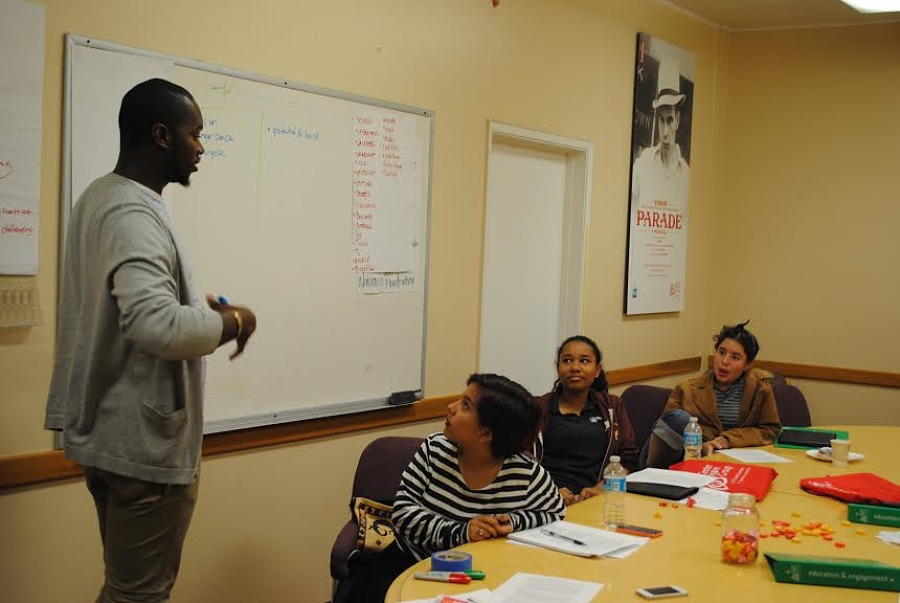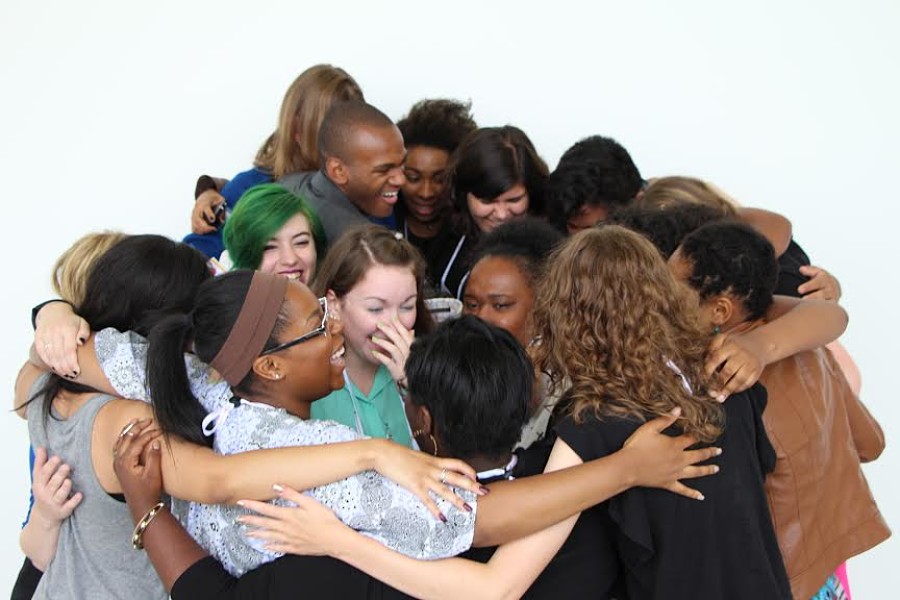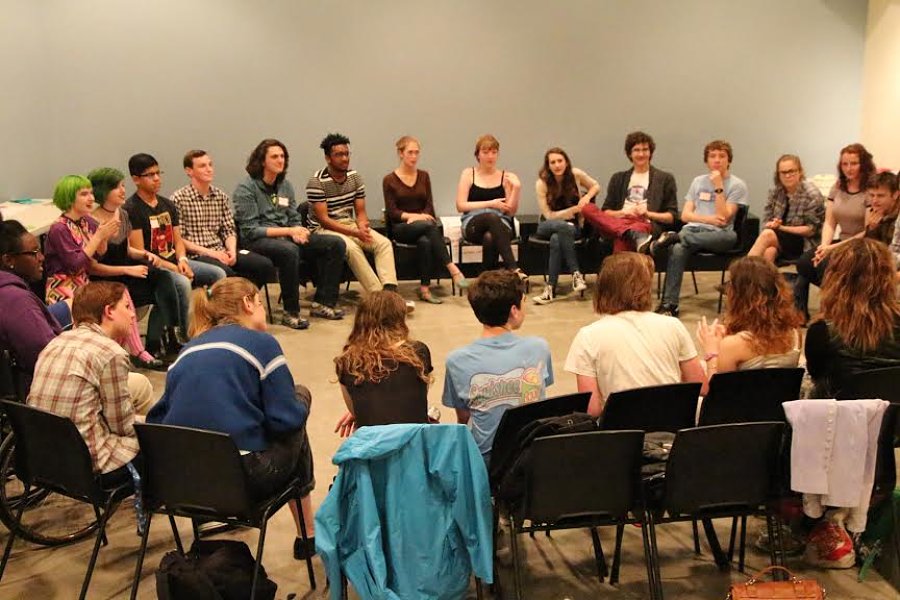Large theatre institutions can seem impenetrable to high schoolers. Narrow programming interests, high ticket costs, and a lack of diversity are just a few of the barriers that can make theatres feel unwelcoming, or worse, irrelevant to teen audiences. So it’s hardly surprising that many theatres are working to break down these walls and integrate teens into their organizations—and not only into their audiences. Through teen council or teen ensemble programs, young folks all over the country are getting hands-on experiences at regional theatres, where they learn all aspects of producing theatre, receive leadership training, and make important contributions to their respective institutions.
Most teen councils develop with the specific needs of the organization in mind, often with students leading the charge, so their size, focus and structure tend to vary.
“Teens were front-and-center in terms of developing the program,” says Rachel Fink, director of the School of Theatre at Berkeley Repertory Theatre. Founded in 2002, the Berkeley Rep teen council now serves more than 400 participants in the Bay Area, with a core council of 14 teens. Members produce a teen playwriting competition and one-act play festival, organize teen nights for Berkeley Rep productions, and receive mentorships from Berkeley Rep artists and administrators.
Explains Fink, “We developed a program that was really responding to what they felt like they needed—an artistic home where they could experiment and explore artistically, where they could learn about the field, as well as interact with their peers from other schools.” Benjamin Hanna, Berkeley Rep’s community programs manager, also emphasizes student ownership when discussing the core council. “They act as a small board of directors, they manage their own budget, they build these events and change and alter them as they need to be changed based on the culture,” Hanna says.
Camille Schenkkan, program manager of Next Generation Initiatives at L.A.’s Center Theatre Group, describes a similarly student-driven development process for CTG’s Student Ambassadors program.

“During our summer planning we ask, ‘Where do we need student input? Where can we really engage them in ways that are meaty and demanding and also necessary to CTG’s work?’” About to begin its fifth year, the Student Ambassador program assigns 24 students to one of four teams, each focusing on a different issue or need facing the theatre; last year’s teams focused on planning pre-show events, arts advocacy, engaging first-time theatregoers, and arts education. Each team then plans and executes a long-term project relating to their team’s topic.
“We genuinely don’t know what they’re going to settle on when we go into the program,” Schenkkan says. “If you look at the teaching artist curriculum, it’s pretty structured for the first few sessions and then becomes less structured, because we have to be really flexible to what they’re interested in.”
A Well-Rounded Theatre Education
Getting an all-around theatre education and acquiring professional skills are hallmarks of all of these programs. “The goal is really to give these teens an opportunity to learn about a professional theatre from every angle,” says Megan Shuchman, associate education director for Steppenwolf for Young Adults, about their Young Adult Council in Chicago. That means “either working behind the scenes in the production or as a part of our marketing team or doing education work in schools. Even if you know you want to be an actor, your job while you’re in the program is to learn about everything else.”
Members of the Young Adult Council also plan events for their peers, help with season planning for Steppenwolf for Young Adults productions, and receive mentorship from artists, staff, and the junior board. The council “provided a unique balance between artistic and administrative learning, which influenced me to pursue a B.A. in Theatre instead of a strictly performance degree,” says Meredith Shadle, a Young Adult Council alumnus and a junior at Northwestern University. “The Young Adult Council taught me how to combine artistic practice with leadership.”
At Cleveland Play House, the CPH College program engages teens in a multifaceted curriculum that includes artist-led master classes, discussion-based workshops, performance attendance, and the opportunity to shadow CPH staff members. “Students are exposed to all aspects of operations,” says education programs manager Allen O’Reilly says. “It’s not just an acting group.”
Founded in 2006, CPH College holds meetings once a month where teens attend workshops, get behind-the-scenes looks at current CPH shows, and see a performance, often engaging with nationally known theatre professionals. They’re also encouraged to work with senior staff and take ownership of administrative projects. “The general manager may offer invitations to help out with various aspects of the organization,” O’Reilly adds. “Teens have helped high-level department heads with tasks, deadlines—not just envelope-stuffing.”
Exploring Social Issues
In many cases, teen council programs are offering students opportunities to explore issues relevant to their lives and their communities. At Alliance Theatre in Atlanta, the teen ensemble works alongside Alliance staff and guest artists to create both traditional and devised theatre, often tackling difficult subject matter. “We do a lot of performances that are really different from the performances we do in high school,” says Delly Fears, an ensemble alumnus about to start her freshman year at Cornell. “We do a lot of heavy-hitting topics in our formal plays—like, we talk a lot about bullying and issues with teacher-student relationships. Teens really want to share their voice and talk about issues that matter to them and to their communities.”
Adds the Alliance’s teen programs assistant Sarah Wallis, “There’s also definitely a trend in theatres to really focus on community engagement, and I think that doing it through and with high school students is really interesting. We’re probably going to add a civic practice-specific piece with the teen ensemble in the coming season to find more opportunities to partner with community organizations, and a lot of that is because of our members like Delly, who aren’t afraid to dive into these really heavy issues.”
At Steppenwolf, Shuchman recounts a story about a student on the council who became interested in using theatre to talk about social change.
“What she really gravitated toward in learning about theatre was coming to understand how theatre strives to tell stories from all different members of our community, and we really use the shows in Steppenwolf for Young Adults to speak to the teen identity,” Shuchman said. “She now wants to use the arts to do community-based work, and previously I don’t think that was something that she knew existed; she hadn’t thought of that as a career.”
Mariah Woods, a Young Adult council alumnus and rising freshman at Temple University, is also looking to marry theatre and arts advocacy.
“I think being a member of the Young Adult Council has made me realize how important arts education is, and it has made me want to become a teaching artist in order to pay forward all of the lessons I have learned,” Woods says. “I will continue to try and get teenagers interested in theatre, and will continue to try and make it a place where everyone feels represented.”
Diversity and Access
A challenge and a priority for all of these programs is ensuring diversity in age, race, ethnicity, schools, and interests among members. All of these programs are free or low-cost; Center Theatre Group even gives each participant a $500 stipend at the end of each year.

“We’ve really diversified which schools [core council members] come from, the demographic of who’s serving on the board, “ Hanna says of Berkeley Rep’s program. The council, in turn, has grown into “a leadership team that spreads throughout the Bay Area, that can bring individuals from each one of those schools and areas to the theatre.” He notes that the time and cost of traveling to the theatre can be a challenge for some students, as can the $10 cost of attending teen nights, so the council often gives free tickets to teachers and community leaders who request them for their students. “They’ll always say yes,” Hanna says. “But we put it before them so that they get to start to talk about the value of art and making sure it’s accessible, and that’s a good way for them to be thinking about it. Often they don’t think about how it happens, or how that ticket gets in their hand.”
At CTG’s Young Ambassador program, membership is application-based, so Schenkkan and her team select a mix of students that will complement and learn from each other. “Choosing students for the program and then putting them on the teams is absolutely curation, so we say, ‘This young woman is very outgoing and confident, so we’re going to put her on the team. This young man is a lot quieter, so we’re going to put him on the team.’”
Inevitably, issues of access also crop up. “We intentionally take a mix of students who have had a lot of exposure to theatre and have loved theatre since they were little kids, and some students who see their first play with us while they’re on the ambassador program, and because of that they start to make these connections between, ‘I’ve had all of this exposure to arts and arts education, you’ve had none of this, why is that when we live a mile apart?’” The result, she says, is that “all of the teens, regardless of what they’re focusing on, end up talking about equity and access in some way.”
Passing the Torch
Through these initiatives, teen council members gain the knowledge and skills to become future leaders of the American theatre. “When I was applying to college, I was able to write a lot about my experiences with the teen ensemble,” says Fears, from the Alliance teen ensemble. “I could talk about working directly under professional artists, professional directors, professional light and sound designers, I got a real professional experience that really set me apart from my peers who had only done high school productions.”
At CPH this past year, teen member Tannica Conway helped create a presentation on CPH’s arts education strategy that was featured at the theatre’s annual gala. “She’s flourished in the program, and we asked her because of her knowledge and reliability,” says O’Reilly.
Negi Esfandiari, a Berkeley Rep teen council alumnus about to enter her senior year at George Washington University, still finds her Berkeley Rep experience indispensable.
“There are places and things I wouldn’t know about if it weren’t for Teen Council, and above all, I value the connections I made during my time there,” Esfandiari says. “I will never go a day without being influenced by the knowledge, confidence, and encouragement Teen Council gave me.”
Emma Halpern is the co-artistic director of New York City Children’s Theater.


